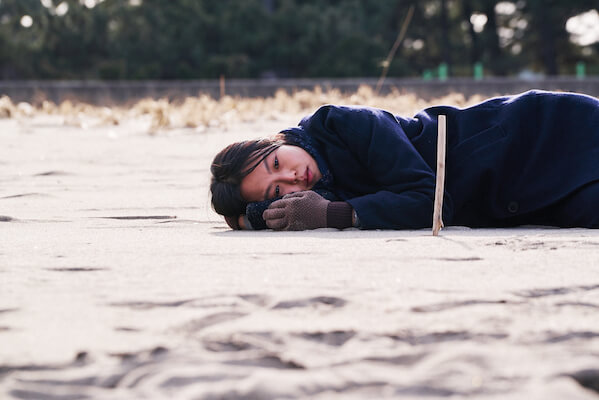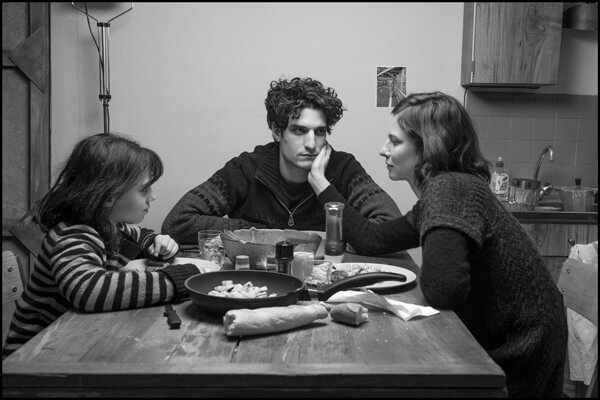In an interview last year, director Serge Bozon divided filmmakers into two categories: those who draw everything from their imagination and those who essentially fictionalize their own lives. He placed Philippe Garrel and the late Jean Eustache in the latter category. Garrel’s latest film, “In the Shadow Of Women,” is a radically austere melodrama of adultery. I don’t know enough about the filmmaker’s personal life to have any idea whether it’s autobiographical, but in the past Garrel has based his work on his involvement with radical politics, his struggles with heroin addiction, and his relationship with singer Nico, whom he has acknowledged as the love of his life.
Garrel is also a child of the French New Wave; he began working at age 16 in the mid ‘60s, although his first decade or so of films were non-narrative. While he finally seems to have found steady, if marginal, American distribution, his early work merits an Eclipse/ Criterion box, particularly the beautiful “The Inner Scar,” in which he and Nico traveled the world to find stunning locations for 360-degreee pans.
Pierre (Stanislas Merhar) and Manon (Clotilde Courau) are a married couple who work together on documentaries directed by Pierre. She takes on the less glamorous task of editing the films, although she accompanies him to interviews. (In an early scene, Pierre talks to an elderly World War II resistance fighter.) Pierre takes a young woman, Elisabeth (Lena Paugam), as his lover, quite casually. He treats both her and Manon shabbily. Unbeknownst to him, Manon is also having an affair, which Elisabeth discovers by peeping through a café window. When she reports that back to Pierre, he reacts with outrage but remains quiet about his own infidelities.
Philippe Garrel explores male, female perspectives on adultery
Like most of Garrel’s films, “In the Shadow Of Women” is in black and white. The 35mm cinematography is high-contrast. It’s rare for movies to be shot on actual celluloid these days, and perhaps as a consequence, Garrel shot each scene in only one take. The film’s look evokes the rough-hewn photography of early French New Wave films, although “In the Shadow Of Women” is slightly slicker. When Manon and Pierre argue for the first time, the room is lit so that Pierre is sunk in deep darkness and she is sitting in bright light. The one French New Wave film to which “In the Shadow Of Women” seems overtly indebted is François Truffaut’s “The Soft Skin,” another drama of adultery. The Truffaut-inspired feel is enhanced by a voice-over supplied by Garrel’s son Louis.
The whole plot of “In the Shadow Of Women” rests on a Parisian culture of outdoor cafes, as well as a kind of bohemia that may only exist in art these days –– or, at least, in cities whose rents are cheaper than Paris or New York. In the opening scene, the landlord barges in on Manon to demand the rent and tell her that the couple has 48 hours to pay up or move out. But this subplot has nothing to do with the main narrative of the film and is never followed up on. Nevertheless, the film returns repeatedly to the couple’s precarious economic status. Manon’s mother tells her that she should have gotten a degree in Oriental Studies so she could have worked as an interpreter, and, late in the film, we see that she’s gone back to school to study that subject.
“In the Shadow Of Women” was written by a team of four screenwriters. Two of them are male, two female. This group includes the legendary Jean-Claude Carriere (who worked with Luis Buñuel) and the should-be-legendary Arlette Langmann (who wrote “A Nos Amours,” directed by Maurice Pialat and perhaps the best female coming-of-age film ever made.) The film does justice to both male and female perspectives on adultery, although the fact that it features a male voice-over gives Pierre’s P.O.V. a slight edge. It captures Pierre’s rank hypocrisy quite well; while it’s true that both partners cheat, Manon gives up her affair as soon as Pierre discovers it and calls her on it. Pierre treats her with an anger to which his behavior leaves him no right. It takes her much longer to learn about his infidelity, a period during which he continues to sleep with Elisabeth.
The film never plays like a male fantasy of middle-aged attractiveness in which 50-year-old men have teenage girls falling for them; Merhar is reasonably young and still handsome enough that it’s understandable for a 21-year-old to sleep with him. In the end, “In the Shadow Of Women” is a film about betrayal, and its final scenes suggest how that betrayal has consequences in the political realm beyond one marriage.
IN THE SHADOW OF WOMEN | Directed by Philippe Garrel | Distrib Films | In French with English subtitles | Opens Jan. 15 | IFC Center, 323 Sixth Ave. at W. Third St.; ifccenter.com | Film Society of Lincoln Center, 70 Lincoln Center Plaza; filmlinc.org

































